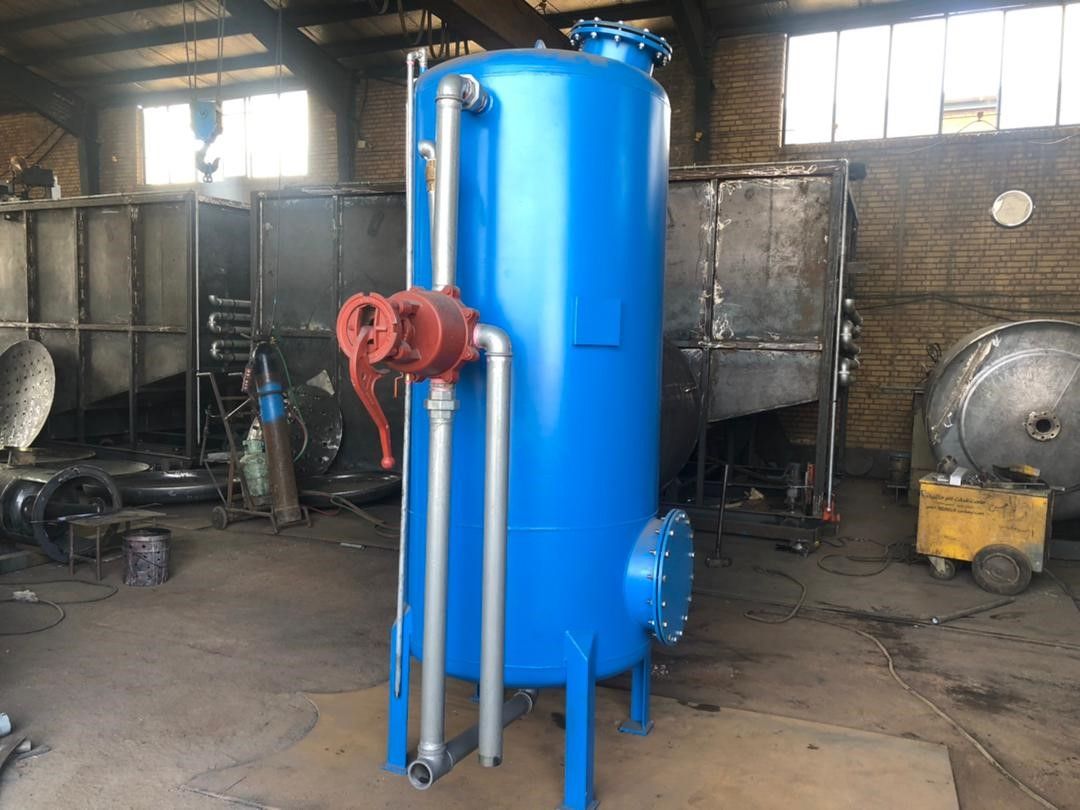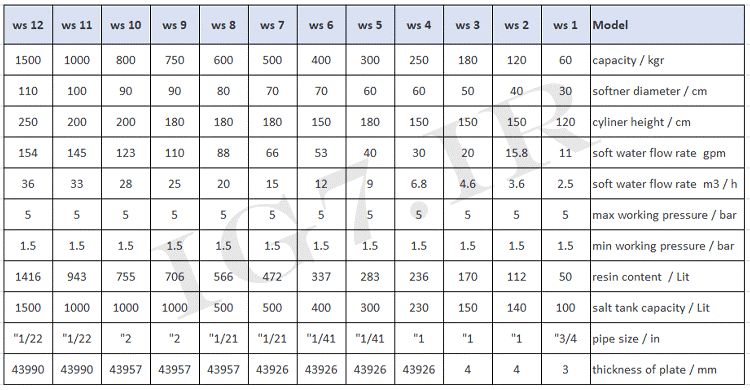The guide for buying industrial and domestic water softener includes a set of important points that should be considered while choosing equipment. The great variety in water softener devices and the differences in their capacity and material may create ambiguities. For this reason, in the following, we will refer to some of the main factors in buying different types of softeners for industrial and domestic resin water softener.

?What is a Water softener
Due to the passage of water through groundwater aquifers and soil and rock layers, salts and carbonate and bicarbonate compounds enter it and will lead to an increase in water hardness. Water hardness is divided into two groups based on the type of solutes in it: temporary hardness or carbonate and permanent hardness or non-carbonate. As the name implies, temporary hardness can be easily removed by boiling and heating water. Otherwise, for permanent hardness, various equipments such as resin softeners must be used. Water Softener are devices that exchange ions in water in a variety of ways, removing calcium, magnesium, and iron carbonates or bicarbonates.
Due to the performance and internal structure of these equipments and softeners have a high variety and therefore are used in many industries.
Important points for buying industrial and domestic water softeners
The equipment used to reduce the hardness of water differs in terms of performance and internal structure. Some of them reduce the hardness with resin grains and play a role in this field with the help of magnetic methods. When buying a domestic and industrial water softener, it is necessary to consider several important points, which are:
Type of water softener
One of the most important and main factors in buying industrial and domestic water softeners is to pay attention to the type of device. Softeners have a high variety and the most common of them are the following:
Depending on the amount and type of solutes in the water, you can finally choose the best and most suitable type. For example, if the goal is to reduce the hardness of domestic and industrial water, resin softener is one of the ideal options. The structure of this equipment uses resin grains that have a high power in ion exchange and water calcium and magnesium are replaced with sodium in it. In other words, in this type of softener, water containing solutes enters the tank of the device and passes through the resin layer. Water solutes exchange resins with ions and reduce the hardness of water.
Note that if you choose the type of resin to buy softeners for industrial and domestic water, you should pay attention to washing and regenerating it. Due to the high ion exchange that takes place in this equipment, the resins lose their sodium and the efficiency of the device is reduced. The correct way to regenerate a resin softener is to use a solution of water and salt to which the lost sodium is returned.
Another practical option that can be chosen to buy industrial and domestic water softeners is magnetic softeners. In this equipment, the solutes in the water are separated with the help of magnetic force and have a great effect on reducing the degree of hardness. Due to the capacity and efficiency of these equipments, resin softeners will be a more suitable option for industrial environments.
Material of the Household water softener tank
Another very important thing to consider when buying a water softener is the material of the tank and the body of the device. In general, stainless steel and corrosion-resistant metals are used for the body of the softener tank. The material of the body and the material used to make them depend on the type of application and the amount of inlet water and pressure in the tank. For example, if the goal is to buy industrial water softeners, metal softeners would be a more ideal option. Because the metals used in their tank have high resistance to pressure and impact and increase and decrease in temperature.
If you want to buy a home water softener, you can choose a fiberglass body. Note that softening with resin grains and magnetic methods are also implemented in equipment with fiberglass body and there are no restrictions in this regard.
?Buy automatic or semi-automatic softeners
As mentioned throughout the text, resin softeners need to be regenerated and therefore the resin grains must be washed periodically and then recovered with a solution of water and salt. The operation of this equipment for resin regeneration is different and should be considered when buying. Some softeners are fully automatic and the time required to regenerate the resin is automatically detected and the device enters the regeneration phase automatically. This type of softener is easier to use and does not require a human operator for recovery.
Another type of softener is semi-automatic and requires the human operator to press the start button of the recovery process. For industrial environments, it is better to buy an automatic resin softener.
Water softening capacity
Softening machines have metal or fiberglass tanks that are completely different in terms of capacity. Depending on the amount of water entering the device in the desired time period, it is necessary to choose options that have the appropriate capacity. In addition to the standard capacities provided for this equipment, tank sizes can be changed in custom samples. Capacity is calculated based on the amount of hardness and the amount of water, etc.
In order to make a fully informed choice, some water softener manufacturers provide guidance table in this regard. So that you can see the capacity of each model of this equipment before buying and register the order accordingly. In the picture below, you can see an example of a resin softener buying guide.
 Prices of industrial and domestic water softeners
Prices of industrial and domestic water softeners
Another important issue to consider when buying a water softener is the price of the equipment. In determining the price of various types of softeners, such as body and tank material, quality of equipment and internal parts, capacity and whether it is automatic or semi-automatic, as well as the operation and type of device are influential. Based on the budget you have, you can finally create a balance between costs and the desired quality and buy the best option.
 icons at the top right corner of the subsection.
icons at the top right corner of the subsection.